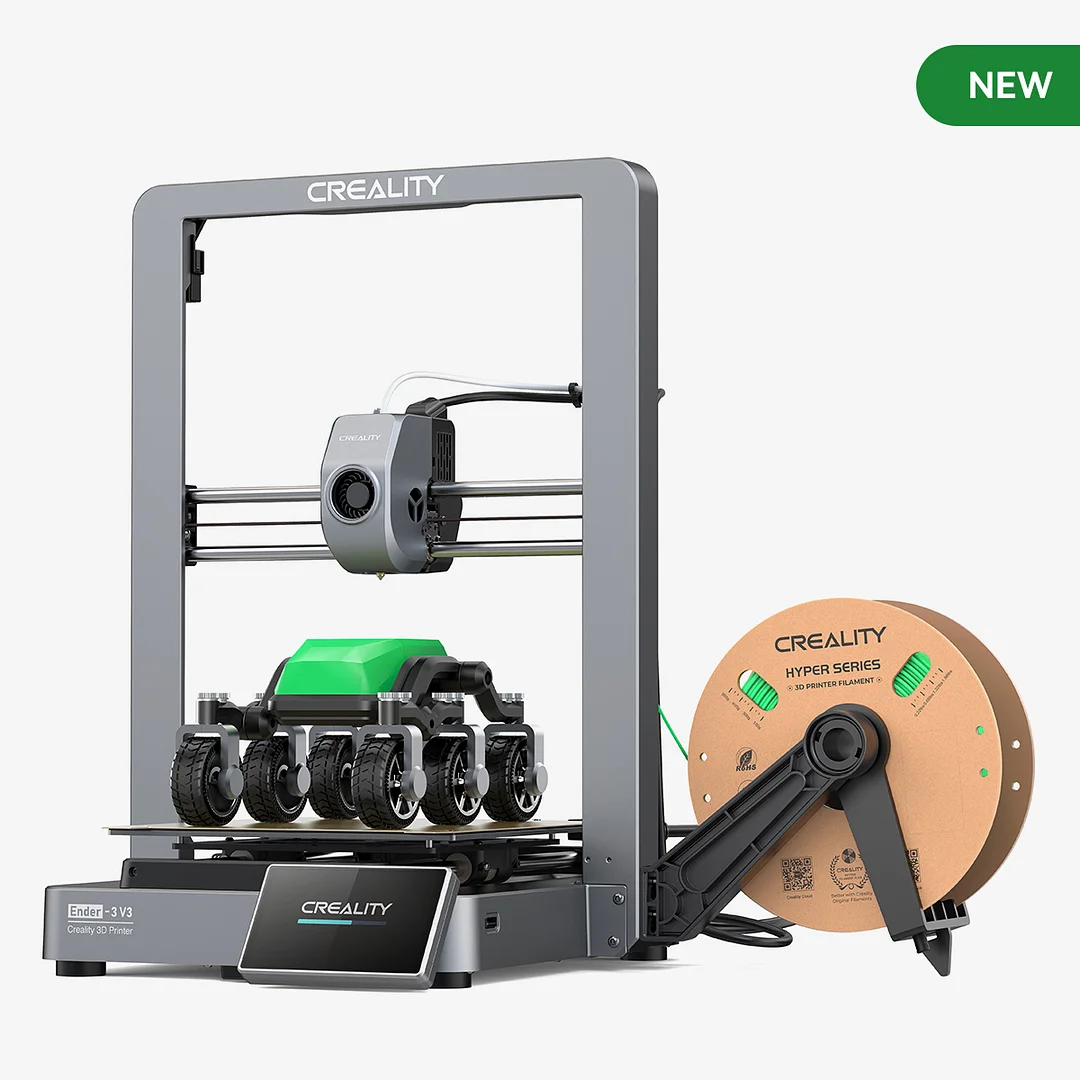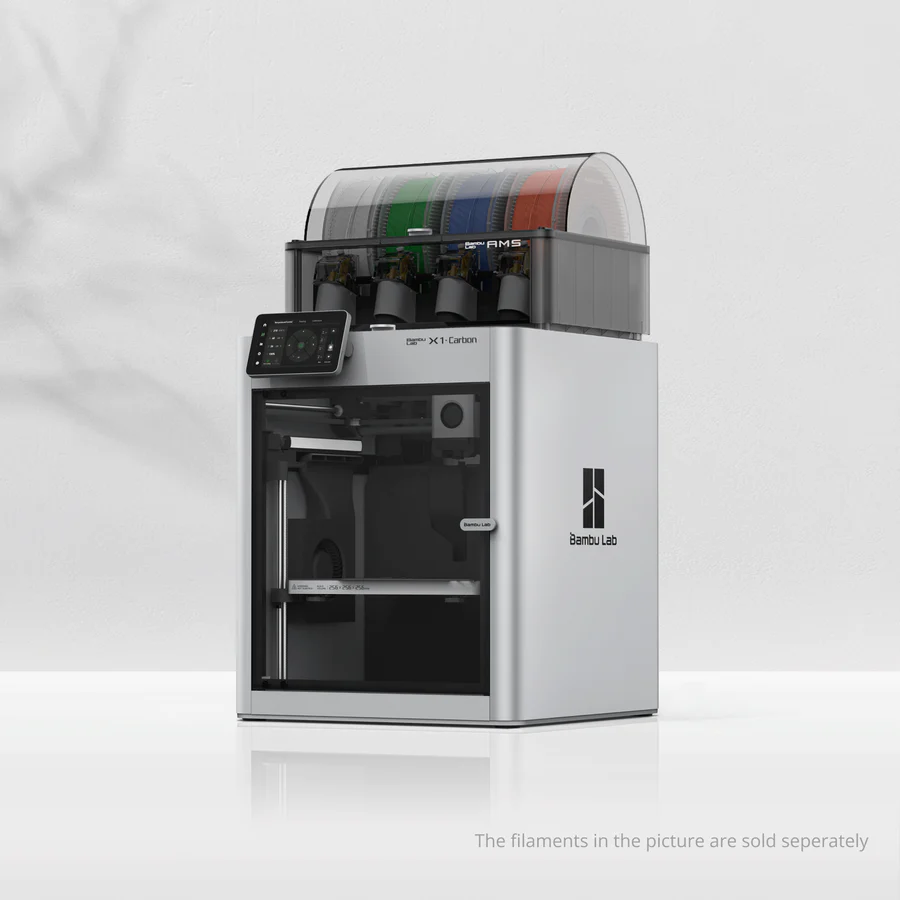Compare Ender 3 V3 vs X1 carbon
Comparison between the best 3D printers
Choose the best 3D printer at the best price. The cheapest 3D printers are here.
Buy a 3D printer here with 3D Fila.
 |
 |
|
| Model | Ender 3 V3[BUY Ender 3 V3] |
X1 carbon |
| Printing Material | Filament | Filament |
| Buy Filament for Creality Ender 3 V3 | Buy Filament forBambu Lab X1 carbon | |
| Estimated price | $389,00 | $1449,00 |
| Manufacturer | Creality | Bambu Lab |
| Release Year | 2024 | 2023 |
| Print Volume [mm] | 220x220x250 | 256x256x256 |
| Printer Size [mm] | 358x374x498 | 389x389x457 |
| Weight [kg] | 7,12 | 14,13 |
| Power Loss Recovery | YES | YES |
| Enclosed printer | NO | YES |
| Bed Leveling | Automatic | Automatic |
| Filament End Sensor | YES | YES |
| Bed type | Heated | Heated |
| Power supply system | Direct Drive | Direct Drive |
| Standard nozzle | 0,4 | 0,4 |
| Maximum Nozzle Temperature [°C] | 300 | 300 |
| Maximum Bed Temperature [°C] | 110 | 120 |
| Maximum printing speed [mm/s] | 600 | 500 |
| Filament holder | YES | YES |
| Camera for supervision | NO | NO |
| Recommended filaments | PLA, PETG e TPU (95A+) | PLA, PETG, TPU, PVA, PA, PA-CF, Nylon, PC |
| Recommended slicers | Creality Print, Cura 5.0 ou superior, Prusa Slicer e Simplify3D | Bambu Studio, Super Slicer, Cura, Prusa Slicer, Orca |
| Maximum Resolution [mm] | 0,01 | 0,1 |
| Processor | 32 Bits | Quad ARM A7 1.2 GHz |
| Display | 4.3" HD touch screen | Touchscreen 5'' |
| Power Supply | 350 W | 350 W |
| Connectivity | USB drive, LAN, Creality Cloud APP | Wifi, Bambu bus, Cartão SD |
| Operating systems | Windows, Linux, Macbook | Windows, Linux, Macbook |
| Date of registration in the system | 2024-03-01 | 2024-04-10 |
| Release date | 2024 | 2023 |
| Extra features | The Ender 3 V3 redefines 3D printing with its CoreXZ system, reaching speeds of up to 600mm/s, and stable metal construction with cast parts. It stands out for its powerful direct extrusion, quick-change tri-metal nozzle, and two powerful fans for instant cooling. Equipped with automatic calibration, it makes leveling and adjustments easy, promoting a fast and reliable printing experience with various materials. | The Bambu Lab X1 Carbon revolutionizes 3D printing with stunning design, high print speeds, and a streamlined user experience. It stands out with its CoreXY system, a hotend capable of reaching 300°C, allowing for a wide range of filaments. Its LiDAR-assisted bed leveling system, vibration compensation, and AMS multicolor printing capability raise the industry standard. Print quality is impressive, with the ability to fine-tune for perfection. The X1 Carbon, with its closed build volume, not only promises but also delivers one of the most advanced 3D printing experiences available to consumers. |
| Support for multiple colors and materials (AMS and CFS) | NO | YES |
Notes * |
||
| Cost-benefit | 7 / 10 | 7 / 10 |
| Hardware | 3.2 / 10 | 5.6 / 10 |
| Tela | . | . |
| Print volume | 3 / 10 | 4 / 10 |
| Performance | 5 / 10 | 4 / 10 |
| [BUY Ender 3 V3] |
Conclusion |
| In comparing the Ender 3 V3 and the Bambu Lab X1 Carbon, several key factors emerge, leading to distinct outcomes based on user priorities. The **Ender 3 V3**, priced affordably, offers an impressive balance of performance for its cost. Its CoreXZ system enables high printing speeds of up to 600mm/s, and the automatic calibration feature makes it user-friendly, particularly for those new to 3D printing. While it has a smaller print volume and lacks advanced features like multipurpose color printing, its straightforward functionality and lower price point make it an attractive choice for hobbyists and budget-conscious users. On the other hand, the **Bambu Lab X1 Carbon** is positioned as a premium option, bringing cutting-edge technology to the table. With a larger print volume, LiDAR-assisted bed leveling, and capabilities for advanced materials and colors, it caters to more professional users or those demanding high-quality results. Its enclosed design also adds an element of safety and reliability, particularly when working with complex materials. In terms of cost-benefit analysis, the Ender 3 V3 scores slightly higher due to its affordability and solid performance for everyday tasks, while the Bambu Lab X1 Carbon, despite its higher price, excels in functionality and advanced features aimed at serious enthusiasts or professionals. Ultimately, the choice between these two printers hinges on the user's budget and needs: the **Ender 3 V3** stands out for entry-level users seeking value without sacrificing quality, whereas the **Bambu Lab X1 Carbon** is better suited for those willing to invest in superior technology and versatility in their 3D printing projects. |

